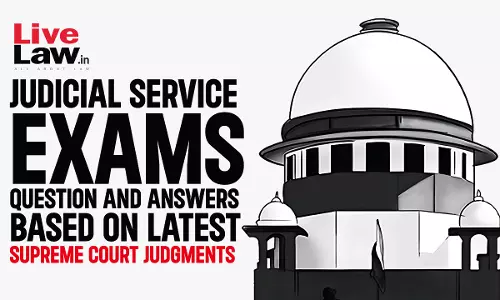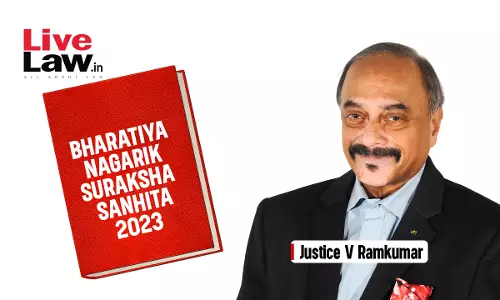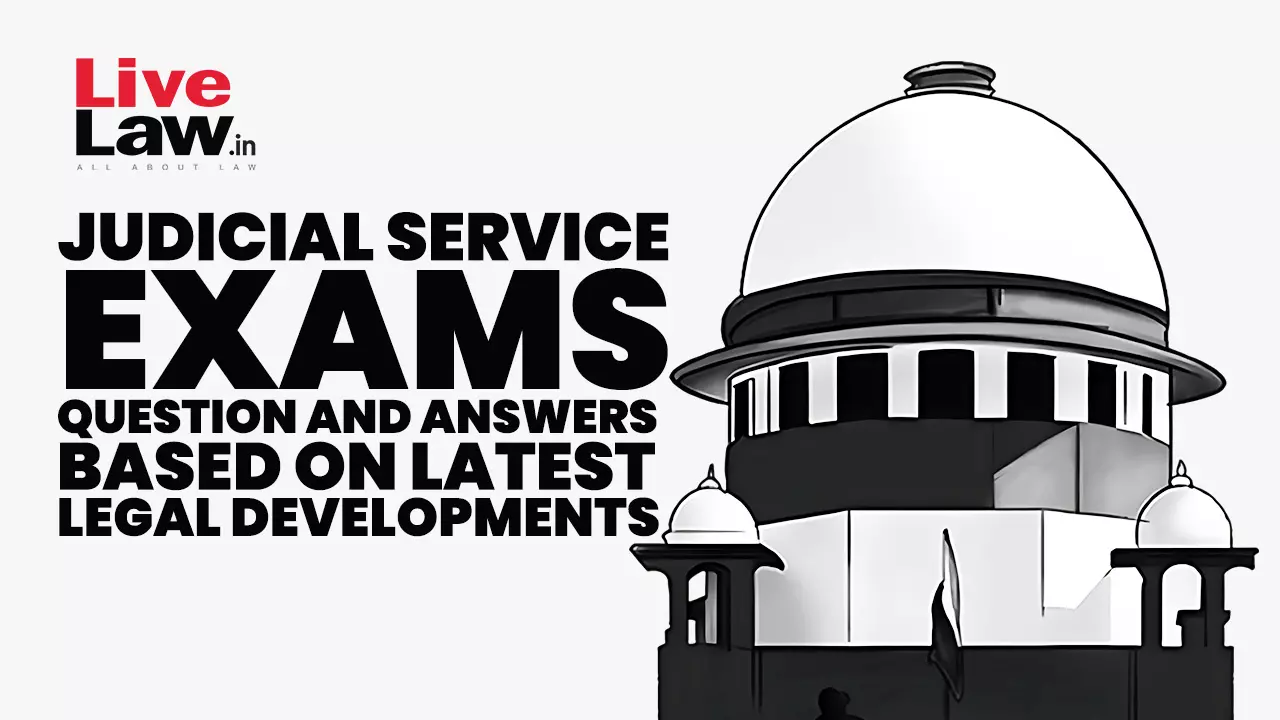Law Exam Updates in India: Schedules, Key Announcements
The Basics Of “Criminal Trial” For The Novices In The Bench And The Bar [Q and A-Part-VII]
FRAMING OF CHARGE BY A MAGISTRATE IN A “WARRANT CASE”(Sections 240 (1) and 246 (1) Cr.P.C.) Q.31 What are the criteria to be satisfied by a Magistrate for framing charge against the accused in a “warrant case” instituted on a Police Report? Ans. If upon consideration of the “prosecution records” and hearing both sides, the Magistrate is of opinion that – 1) ...
The Basics Of “Criminal Trial” For The Novices In The Bench And The Bar [Q and A-Part-VI]
STARTING OF TRIAL IN A “SUMMONS CASE” BEFORE A MAGISTRATEQ.26 When does the trial start in a “summons case” before a Magistrate ? Ans. When the accused appears in response to the process issued against him, the Magistrate shall comply with Section 207 Cr.P.C. (If it is a Police Report) or Section 208 Cr.P.C. (if it is a complaint case) by furnishing the accused with...
The Basics Of “Criminal Trial” For The Novices In The Bench And The Bar [Q and A-Part-V]
TYPES OF CASES Q.24 Which are the types of cases envisaged by the Cr.P.C.? Ans. Cases coming up for trial before Criminal Courts are either “summons cases” punishable with imprisonment upto 2 years and “warrant cases” punishable with imprisonment exceeding 2 years. Cases triable by Magistrates as “summary trials” under Chapter XXI are mild forms of “summons...
Summary Trial Explained By Justice V Ramkumar [Q and A]
We have already seen that there are only two types of cases, namely, “summons cases” and “warrant cases”. Since as per the exclusionary definition under Section 2 (w) Cr.P.C., a “summons case” is one relating to an offence not being a “warrant case”, we have to find out as to what exactly is a “warrant case”. Section 2 (x) Cr.P.C. defines a “warrant case” to mean...
The Basics Of “Criminal Trial” For The Novices In The Bench And The Bar [Q and A-Part-IV]
COMMENCEMENT OF PROCEEDINGS – Chapter XVISections 204 to 210 Cr.P.C. Q.19 When can it be said that “proceedings” have been commenced before a Magistrate? Ans. “Proceedings”, can be said to have commenced before a Magistrate when the Magistrate, after taking cognizance of the offence, issues process to the accused under Section 204 Cr.P.C. Even in a case where...
The Basics Of “Criminal Trial” For The Novices In The Bench And The Bar [Q and A-Part-III]
Q.11 What is meant by “taking cognizance of an offence” ? Ans. Every case instituted before a Criminal Court alleging a “cognizable offence” or a “non-cognizable offence” will have to be scrutinized by the Court and the alleged offence will have to be taken cognizance of under Section 190 Cr.P.C. Taking cognizance of an offence broadly means “taking judicial notice by...
Important MCQs Based On Latest Supreme Court Judgments For Law Examinations
Q 1. Against an accused, a non-bailable warrant and proclamation under Section 82 Cr.P.C. is pending. Whether an application of the accused seeking anticipatory bail is maintainable before the court?a. Yes, the right to seek anticipatory bail is a statutory right under Cr.P.C. b. Yes, anticipatory bail cannot be denied because it should be heard on its merit uninfluenced by the...
Default Bail: The Infirmities Noted In Section 187 Of The Bharatiya Nagarik Suraksha Sanhita, 2023
C O N T E N T S Sl. Order. I N N E R T I T L E S Para No. 1 COMPARATIVE TABLE SHOWING SECTION 167 Cr.P.C AND SECTION 187 OF BNSS 2 MY COMMENTS ON SECTION 187 OF BNSS 1 to 6 3 The change from the “nearest judicial ...
The Basics Of “Criminal Trial” For The Novices In The Bench And The Bar [Q and A-Part-II]
“POLICE REPORT” Q.7 What is a “Police Report” ? Ans. A “Police Report” as defined under Section 2 (r) Cr.P.C. is the “final report” filed under Section 173 (2) Cr.P.C. by a Police Officer after the conclusion of investigation under Chapter XII Cr.P.C. A case can be instituted before a Magistrate either by means of a “police report” or...
Important MCQs Based On Latest Supreme Court Judgments For Law Examinations
Q 1. The Supreme Court cannot convert the accused acquittal to conviction under Article 136 of the Constitution. Test out the validity of the statement with the following options.a. The Supreme Court couldn't interfere with the order of acquittal.b. It is impermissible for the Supreme Court to convert the order of acquittal to conviction.c. It is permissible for the Supreme Court to convert...
The Basics Of “Criminal Trial” For The Novices In The Bench And The Bar [Q and A-Part-I]
Q.1 What is a “cognizable offence” and a “cognizable case”? Ans. Section 2 (c) Cr.P.C defines both the above expressions as follows:- “2 (c) – “cognizable offence” means an offence for which, and “cognizable case” means a case in which, a police officer may, in accordance with the First Schedule or under any other law for the time being in...
A Comprehensive Evaluation Of Section 31 Cr.P.C Regarding The Sentence To Be Passed For Several Offences At One Trial [Q And A] [PART-II]
PART-I Of This Article Can be read hereTHE COMBINED OPERATION OF SECTIONS 31 AND 325 Cr.P.C.This can be better understood by discussing a concrete example in the form of a problem. PROBLEM As members of an unlawful assembly sharing the same common object, A1 to A5 committed rioting and attacked PWs 1 to 3 from a public road at 7 pm. A1 and A2 were each wielding...



![The Basics Of “Criminal Trial” For The Novices In The Bench And The Bar [Q and A-Part-VII] The Basics Of “Criminal Trial” For The Novices In The Bench And The Bar [Q and A-Part-VII]](https://www.livelaw.in/h-upload/2024/04/06/500x300_532510-the-basics-of-criminal-trial-jusice-ram-kumar.webp)
![The Basics Of “Criminal Trial” For The Novices In The Bench And The Bar [Q and A-Part-VI] The Basics Of “Criminal Trial” For The Novices In The Bench And The Bar [Q and A-Part-VI]](https://www.livelaw.in/h-upload/2024/03/15/500x300_528302-the-basics-of-criminal-trial-justice-ram-kumar.webp)
![Summary Trial Explained By Justice V Ramkumar [Q and A] Summary Trial Explained By Justice V Ramkumar [Q and A]](https://www.livelaw.in/h-upload/2024/03/27/500x300_530793-summary-trial-explained-by-justice-v-ramkumar-q-and-a.webp)
![The Basics Of “Criminal Trial” For The Novices In The Bench And The Bar [Q and A-Part-IV] The Basics Of “Criminal Trial” For The Novices In The Bench And The Bar [Q and A-Part-IV]](https://www.livelaw.in/h-upload/2024/03/26/500x300_530647-the-basics-of-criminal-trial-jusice-ram-kumar.webp)
![The Basics Of “Criminal Trial” For The Novices In The Bench And The Bar [Q and A-Part-III] The Basics Of “Criminal Trial” For The Novices In The Bench And The Bar [Q and A-Part-III]](https://www.livelaw.in/h-upload/2024/03/26/500x300_530646-the-basics-of-criminal-trial-jusice-ram-kumar-3.webp)


![The Basics Of “Criminal Trial” For The Novices In The Bench And The Bar [Q and A-Part-II] The Basics Of “Criminal Trial” For The Novices In The Bench And The Bar [Q and A-Part-II]](https://www.livelaw.in/h-upload/2024/03/15/500x300_528329-the-basics-of-criminal-trial-jusice-ram-kumar-part-2.webp)

![The Basics Of “Criminal Trial” For The Novices In The Bench And The Bar [Q and A-Part-I] The Basics Of “Criminal Trial” For The Novices In The Bench And The Bar [Q and A-Part-I]](https://www.livelaw.in/h-upload/2024/03/15/500x300_528328-the-basics-of-criminal-trial-jusice-ram-kumar-part-1.webp)
![A Comprehensive Evaluation Of Section 31 Cr.P.C Regarding The Sentence To Be Passed For Several Offences At One Trial [Q And A] [PART-II] A Comprehensive Evaluation Of Section 31 Cr.P.C Regarding The Sentence To Be Passed For Several Offences At One Trial [Q And A] [PART-II]](https://www.livelaw.in/h-upload/2024/03/15/500x300_528309-section-31-justice-v-ramkumar.webp)